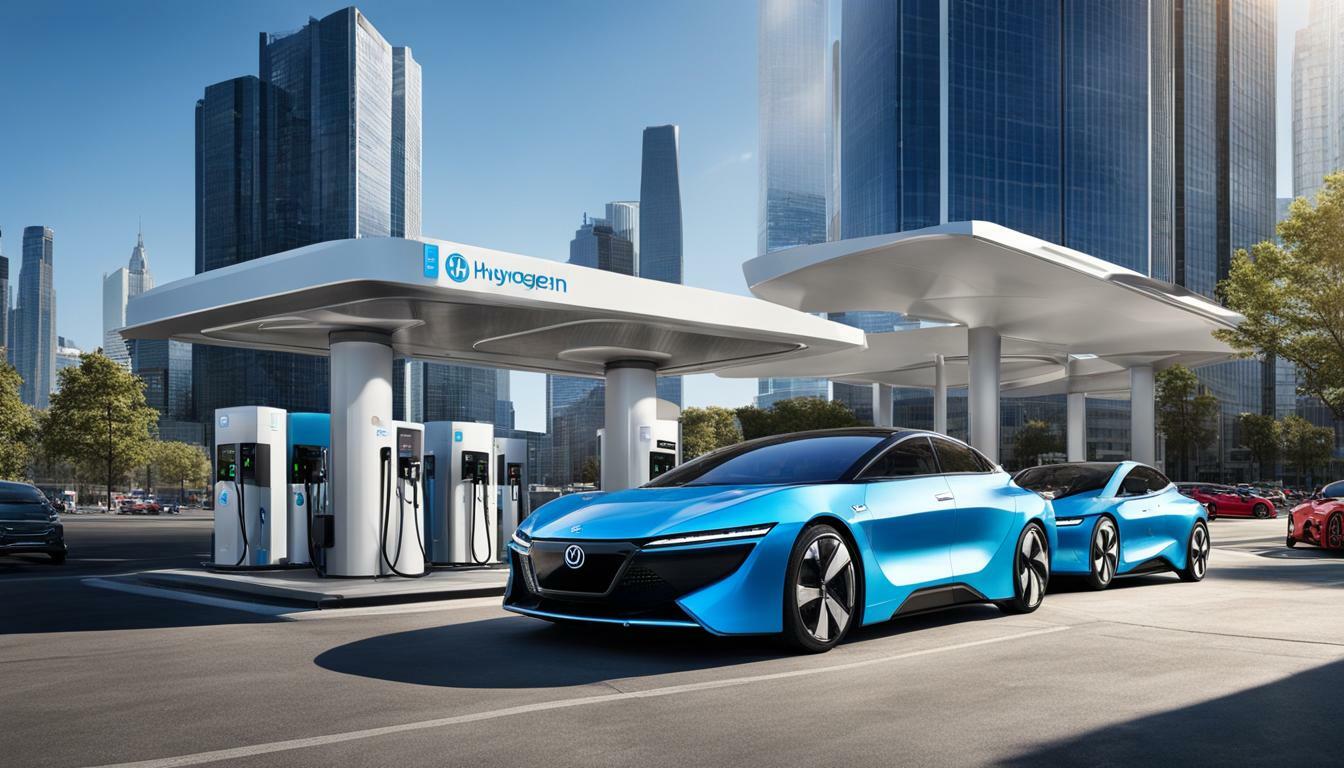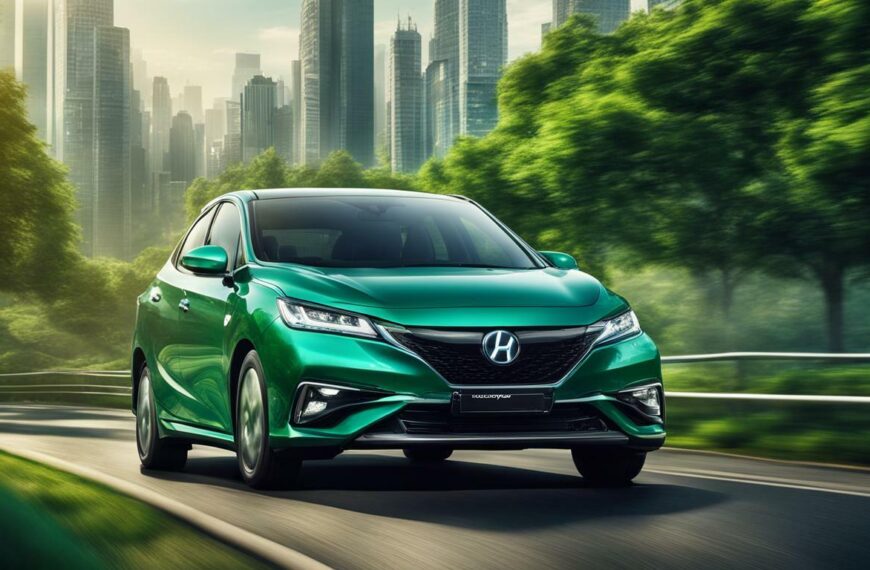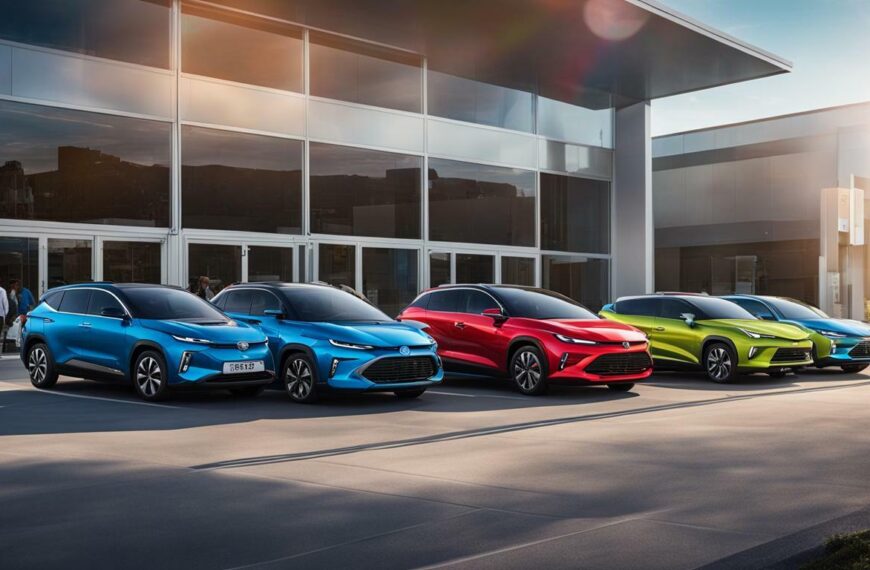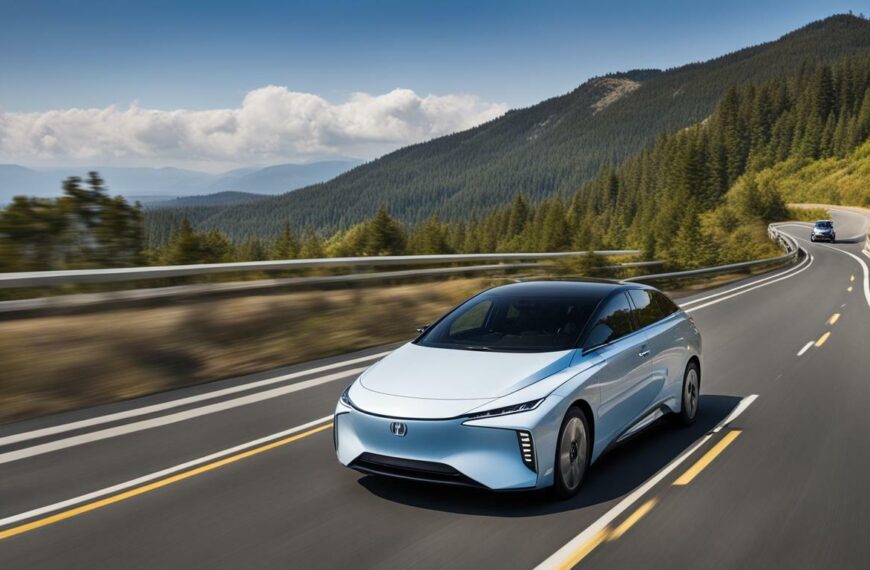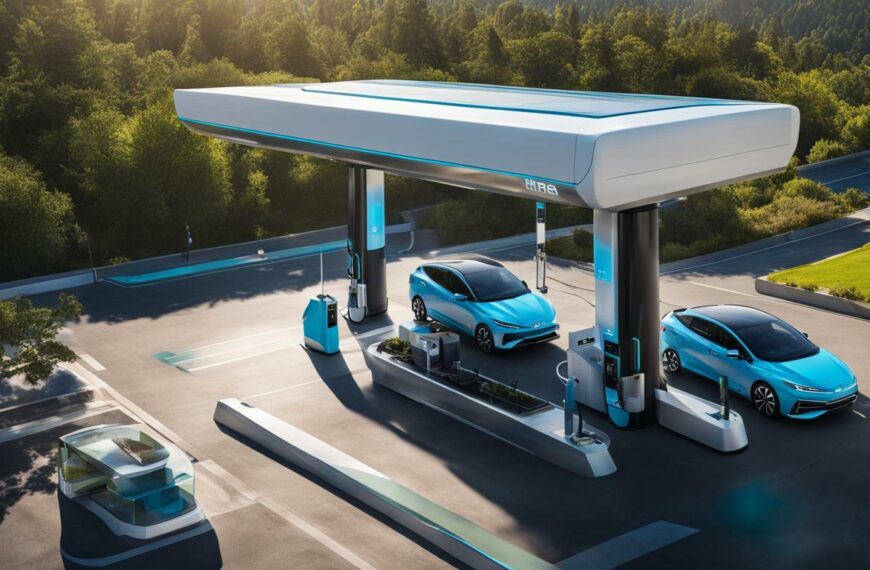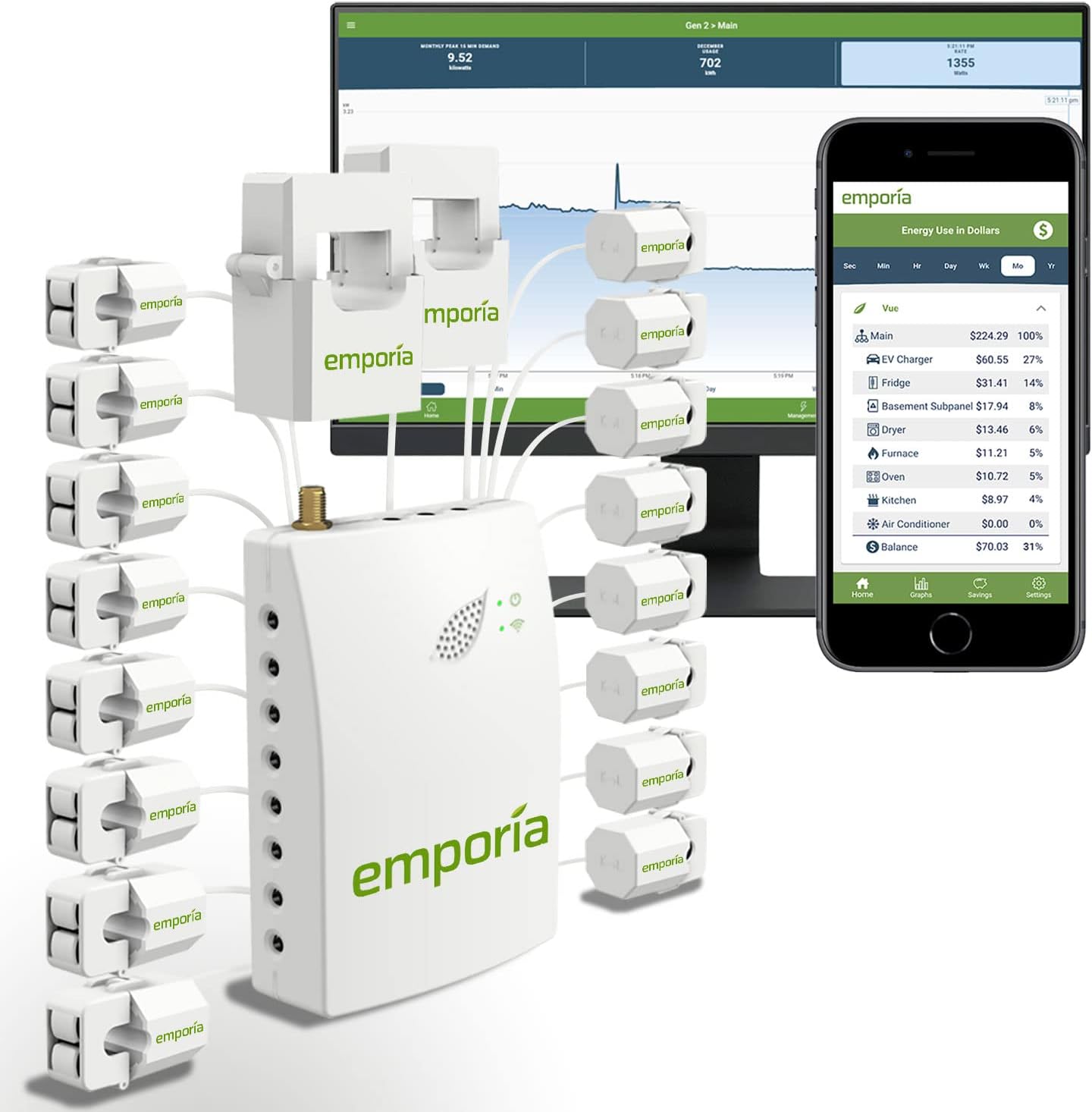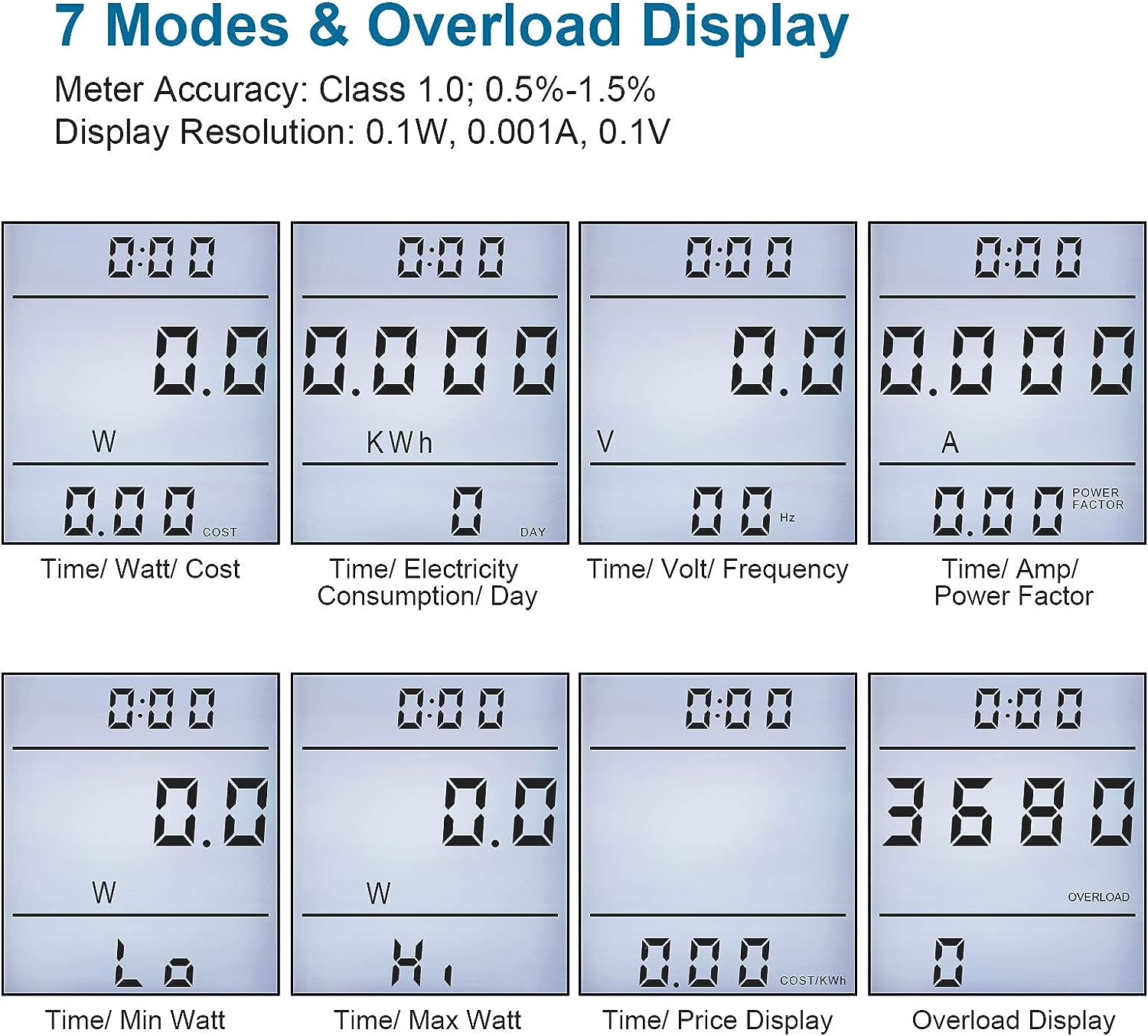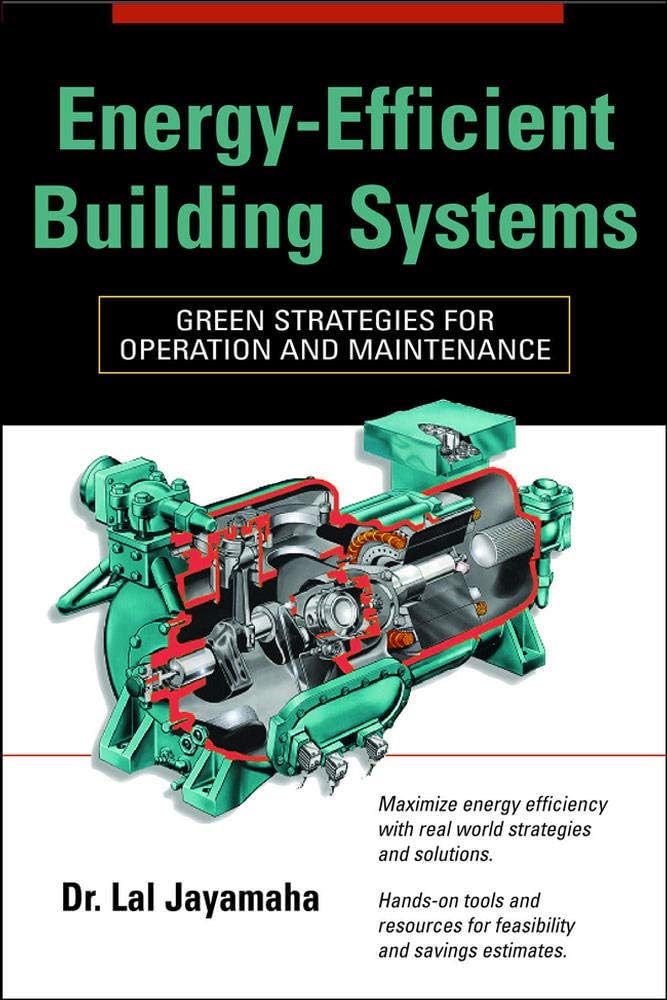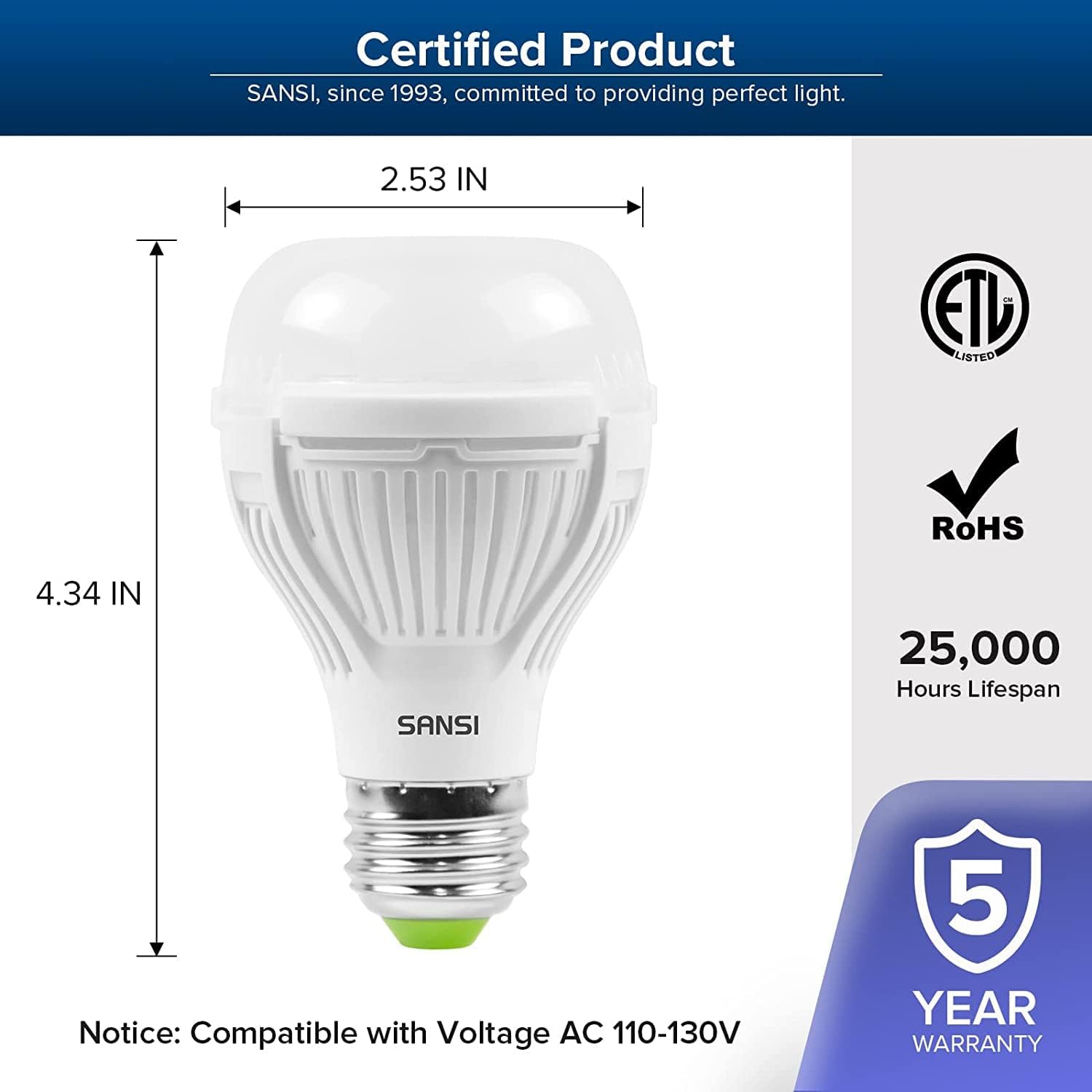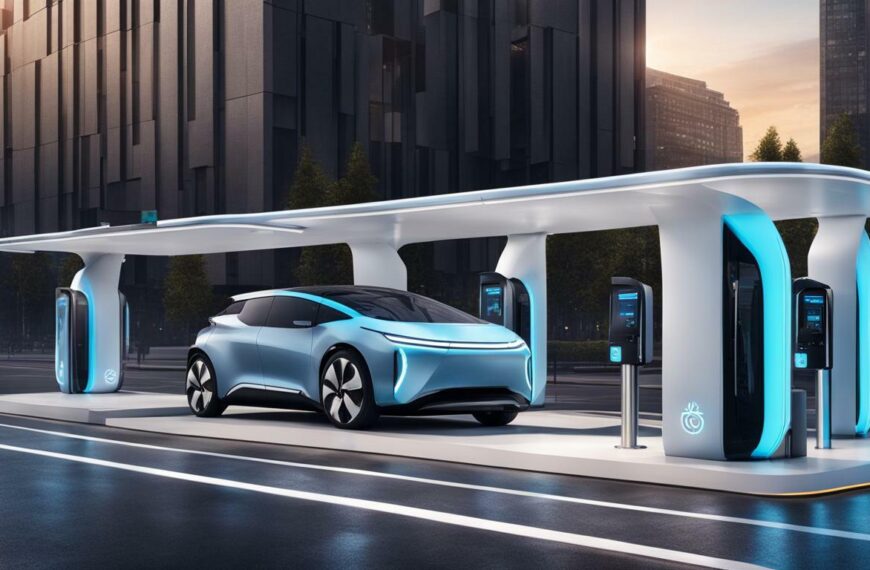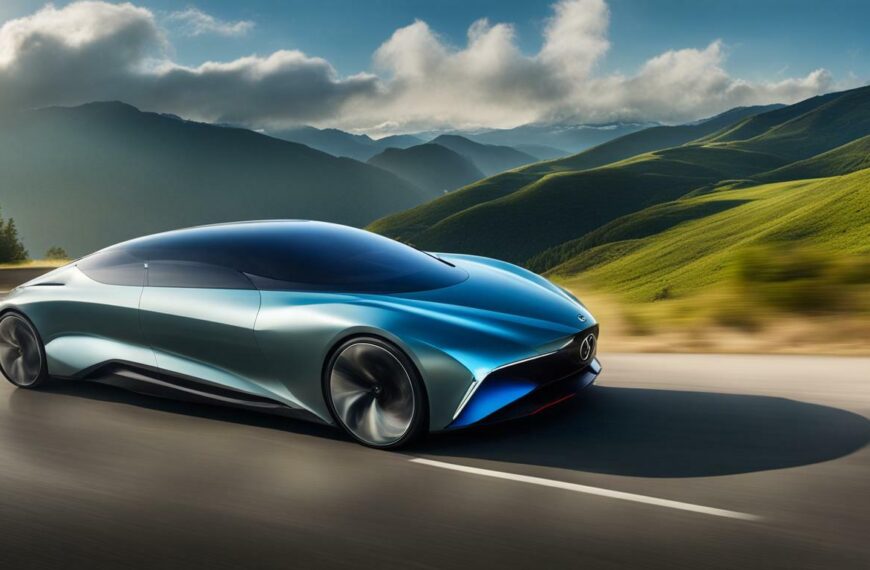Hydrogen leverages gas stations to promote a sustainable future in the fuel industry, creating an alternative fuel network through hydrogen fueling stations. With the focus on supporting the rollout of fuel cell electric vehicles (FCEVs), hydrogen and gas stations have become the perfect combination. This partnership has primarily taken place in select markets like California, where hydrogen fueling locations are being added to existing gasoline stations. Efforts are also underway to expand hydrogen infrastructure in Hawaii and across the East Coast, making hydrogen more accessible to a wider range of consumers.
Key Takeaways:
- Hydrogen and gas stations are working together to promote a sustainable future in the fuel industry.
- The focus is on supporting the rollout of fuel cell electric vehicles (FCEVs).
- Hydrogen fueling locations are being added to existing gasoline stations in select markets like California.
- Efforts are underway to expand hydrogen infrastructure in Hawaii and across the East Coast.
- Hydrogen is not only for FCEVs but also for buses, medium-duty fleets, and material handling equipment.
Supporting the Rollout of Hydrogen Infrastructure
Hydrogen plays a crucial role in supporting the rollout of hydrogen infrastructure, enabling convenient refueling for vehicles and contributing to a sustainable energy system. Fuel cell electric vehicles (FCEVs) rely on hydrogen refueling to provide clean and efficient transportation. The focus has been on integrating hydrogen fuel at existing gasoline stations in select markets, with California leading the way.
In California, hydrogen fueling locations are already established, providing FCEV owners with the necessary infrastructure to refuel their vehicles. The market for FCEVs in California is growing steadily, and the availability of hydrogen fueling stations is a crucial factor in promoting their adoption.
Efforts to expand hydrogen infrastructure are not limited to California. Initiatives in Hawaii and across the East Coast aim to increase the availability of hydrogen fueling stations, ensuring convenient refueling for FCEVs in these regions as well. This expansion is essential for supporting long-distance travel and establishing a comprehensive hydrogen fuel network.
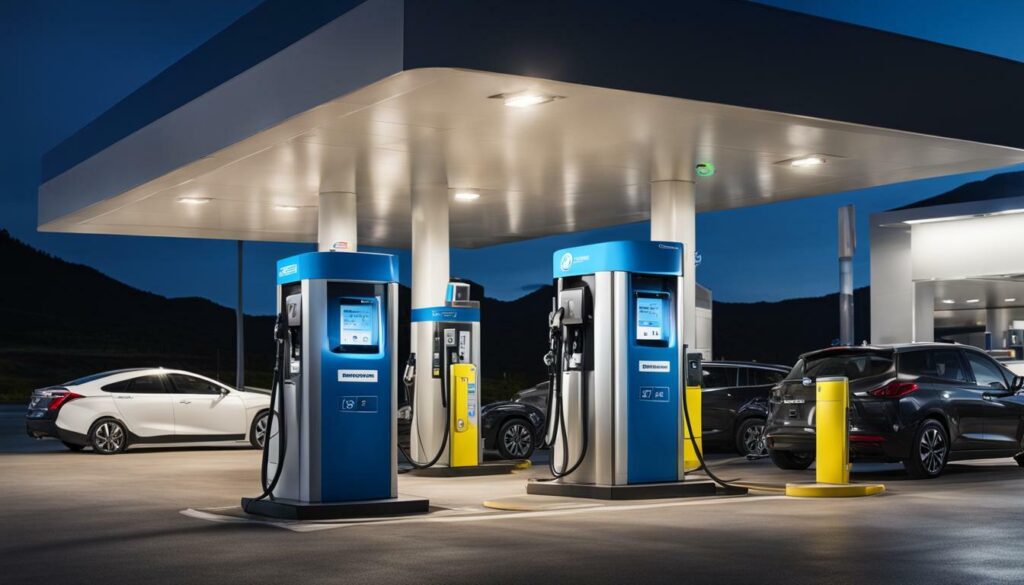
Hydrogen infrastructure extends beyond FCEVs, encompassing buses, medium-duty fleets, and material handling equipment. These applications present an opportunity to leverage hydrogen’s benefits in various sectors, reducing emissions and promoting sustainable practices. The development of infrastructure to support these vehicles and equipment is critical in transitioning to a greener and more efficient transportation system.
Private fleet fueling stations require fewer locations compared to public consumer stations. This distinction reflects the specific needs of each sector and ensures efficient deployment of hydrogen infrastructure. Additionally, mobile hydrogen fuelers and heavy-duty hydrogen trucks are being developed, further expanding the reach of hydrogen refueling capabilities.
In partnership with Nikola, Voltera aims to develop up to 50 hydrogen refueling stations throughout North America. This ambitious project aligns with the shared vision of accelerating the adoption of zero-emission vehicles. By increasing the availability of hydrogen refueling stations, the partnership seeks to overcome one of the key barriers to widespread adoption of FCEVs and support the expansion of hydrogen infrastructure across the continent.
Summary:
- Hydrogen infrastructure supports the rollout of FCEVs and contributes to a sustainable energy system.
- California leads in establishing hydrogen fueling locations, with a growing market for FCEVs.
- Efforts are underway to expand hydrogen infrastructure in Hawaii and across the East Coast.
- Hydrogen infrastructure extends to buses, medium-duty fleets, and material handling equipment.
- Private fleet fueling stations require fewer locations compared to public consumer stations.
- Mobile hydrogen fuelers and heavy-duty hydrogen trucks are being developed to enhance accessibility.
- Nikola and Voltera’s partnership aims to develop hydrogen refueling stations throughout North America.
| State/Region | Hydrogen Fueling Stations |
|---|---|
| California | 100+ |
| Hawaii | 10+ |
| East Coast | 20+ |
| National Total | 150+ |
Gas stations in California are actively incorporating hydrogen fueling stations to cater to the growing demand for fuel cell electric vehicles (FCEVs) in the state. California has been at the forefront of promoting clean energy solutions, and hydrogen infrastructure is a key component of their sustainable transportation strategy. The state’s commitment to reducing greenhouse gas emissions and improving air quality has paved the way for the development of hydrogen fueling locations.
Hydrogen fueling stations in California are strategically located to ensure convenient access for FCEV owners. These stations play a crucial role in supporting the adoption of hydrogen-powered vehicles by providing a reliable and efficient refueling infrastructure. With the increasing popularity of FCEVs, ensuring an adequate number of fueling stations is essential to meet the growing demand.
California currently boasts a robust network of hydrogen fueling locations, making it easier for FCEV owners to travel longer distances without worrying about refueling. This infrastructure development is crucial to alleviate range anxiety and encourage more consumers to switch to zero-emission vehicles. With the continuous expansion of hydrogen infrastructure, the state aims to create a sustainable future for transportation.
| Key Benefits of Hydrogen Fueling Stations in California |
|---|
| The availability of hydrogen fueling stations supports the growth of FCEVs. |
| Convenient access to refueling infrastructure increases consumer confidence in FCEVs. |
| Hydrogen fueling locations contribute to the reduction of greenhouse gas emissions. |
| FCEV owners can travel longer distances without range anxiety, thanks to the extensive network of hydrogen fueling stations. |
As California continues its efforts to promote sustainable transportation, the development of hydrogen infrastructure remains a priority. The state’s commitment to creating a cleaner future has led to the successful integration of hydrogen fueling stations within existing gas stations. This innovative approach not only supports the growing demand for FCEVs but also contributes to reducing the overall carbon footprint of transportation in California.

Expanding Hydrogen Infrastructure Across Hawaii and the East Coast
The expansion of hydrogen infrastructure is not limited to California, with efforts underway in Hawaii and along the East Coast to establish a comprehensive network of hydrogen fueling stations. These initiatives aim to support the growing demand for hydrogen fuel and enable the widespread adoption of fuel cell electric vehicles (FCEVs) in these regions.
In Hawaii, the focus is on leveraging the state’s abundant renewable energy resources to produce clean hydrogen. This approach aligns with Hawaii’s commitment to achieving 100% renewable energy by 2045. The state recognizes the role of hydrogen as a key component of its sustainable energy system and is actively investing in the development of hydrogen fueling infrastructure.
Along the East Coast, several states have joined forces to create a coordinated strategy for expanding hydrogen infrastructure. This collaborative effort aims to establish a network of hydrogen fueling stations that will enable FCEV drivers to travel seamlessly across the region. By strategically locating these fueling stations along major highways and transportation corridors, the goal is to provide convenient access to hydrogen fuel and support the growth of the FCEV market.
| State | Number of Hydrogen Fueling Stations |
|---|---|
| Hawaii | 12 |
| Connecticut | 8 |
| New York | 15 |
| New Jersey | 10 |
| Massachusetts | 11 |
These efforts to expand hydrogen infrastructure across Hawaii and the East Coast will not only facilitate the adoption of FCEVs but also contribute to reducing greenhouse gas emissions and improving air quality. By providing clean, sustainable fueling options, hydrogen fueling stations play a vital role in creating a more sustainable future for transportation.
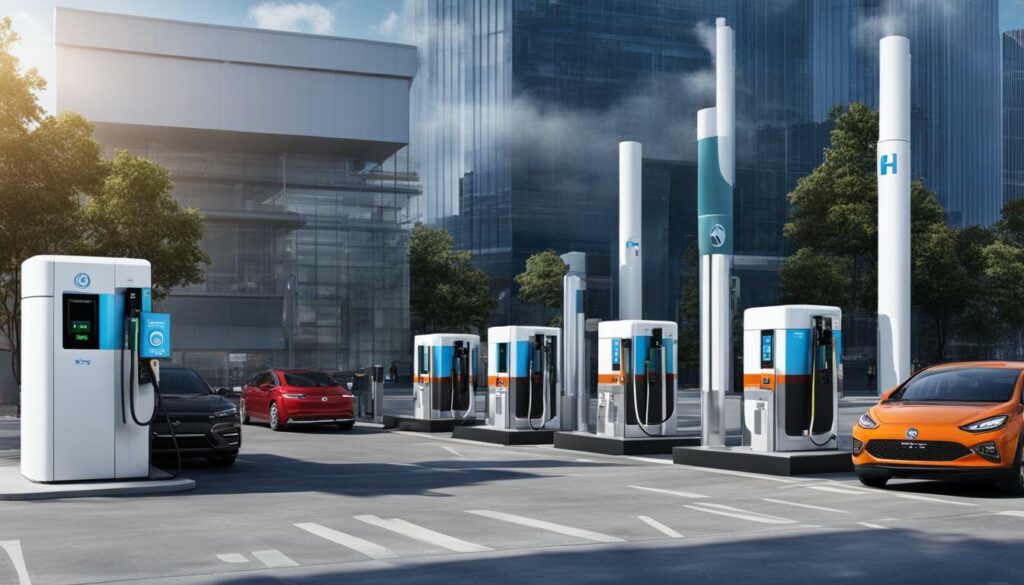
Hydrogen Infrastructure for Buses, Medium-duty Fleets, and Material Handling Equipment
Hydrogen infrastructure is being developed to support the fueling needs of buses, medium-duty fleets, and material handling equipment, paving the way for sustainable transportation solutions. As the demand for clean and efficient vehicles continues to grow, hydrogen is emerging as a viable option due to its zero-emission characteristics and fast refueling times.
One of the key advantages of hydrogen-powered buses, medium-duty fleets, and material handling equipment is their ability to cover long distances without compromising performance. These vehicles can operate for extended periods, making them ideal for transportation and logistics sectors. To ensure the widespread adoption of hydrogen technology, the development of a robust infrastructure is crucial.
Table: 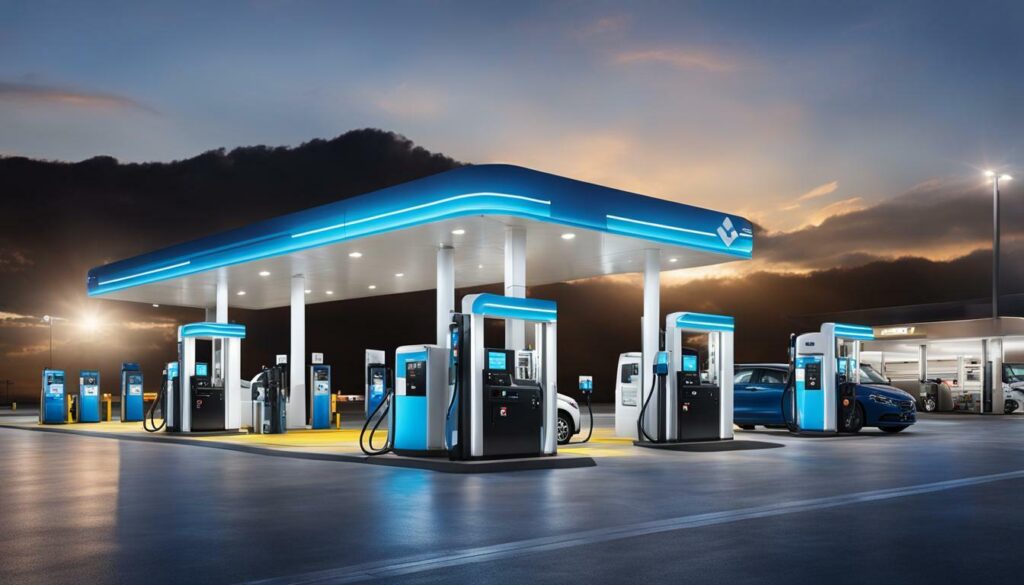
As highlighted in the table above, the infrastructure for hydrogen-powered vehicles includes hydrogen production, storage, and refueling stations. For buses and medium-duty fleets, centralized refueling stations located strategically along major transit routes can efficiently cater to their fueling requirements. Material handling equipment, on the other hand, may benefit from on-site fueling stations situated within warehouses or distribution centers.
Benefits of Hydrogen Infrastructure for Buses, Medium-duty Fleets, and Material Handling Equipment
- Reduced greenhouse gas emissions: Hydrogen-powered vehicles emit only water vapor, contributing to a cleaner and greener environment.
- Enhanced operational efficiency: With fast refueling times, hydrogen-powered vehicles can minimize downtime, ensuring constant productivity for commercial fleets.
- Improved range and payload capacity: Hydrogen technology enables buses, medium-duty fleets, and material handling equipment to travel longer distances and carry heavier loads, meeting the needs of various industries.
- Supporting a sustainable energy system: Hydrogen infrastructure is an integral part of a diverse and sustainable energy system, complementing renewable energy sources and reducing dependence on fossil fuels.
“Hydrogen-powered buses, medium-duty fleets, and material handling equipment have the potential to transform the transportation landscape by offering zero-emission solutions. The development of hydrogen infrastructure is crucial in supporting the widespread adoption of these vehicles, creating a sustainable and efficient transportation ecosystem.”
By investing in hydrogen infrastructure for buses, medium-duty fleets, and material handling equipment, we can unlock the full potential of hydrogen as a clean energy source. As advancements continue, hydrogen-powered vehicles will play a significant role in achieving a greener future with reduced carbon emissions and improved air quality.
Private Fleet Fueling Stations and Public Consumer Stations
Private fleet fueling stations have different infrastructure requirements compared to public consumer stations, with private fleet stations needing fewer locations to cater to specific fleet fueling needs. While public consumer stations are designed to accommodate a wide range of vehicles and provide access to the general public, private fleet stations are strategically located to serve the fueling requirements of a specific fleet.
Private fleet fueling stations offer dedicated fueling solutions for companies with a fleet of vehicles, such as delivery vans, taxis, or corporate cars. These stations are typically located within the premises of the fleet owner, ensuring easy access and minimizing downtime for refueling. By having a centralized fueling location, private fleet stations can efficiently manage fuel supply and optimize logistics.
| Private Fleet Fueling Stations | Public Consumer Stations |
|---|---|
| Located within fleet premises | Accessible to the general public |
| Caters to a specific fleet | Serves a wide range of vehicles |
| Minimizes downtime for refueling | Offers convenience to individual vehicle owners |
Additionally, private fleet fueling stations can incorporate advanced technologies to enhance efficiency and track fuel consumption. These stations can be integrated with fleet management systems, allowing for real-time monitoring of fuel usage, maintenance schedules, and performance metrics.
Overall, private fleet fueling stations play a crucial role in supporting the adoption of hydrogen fuel for fleet vehicles. With their streamlined infrastructure and dedicated service, these stations provide tailored solutions that meet the specific needs of fleet operators, contributing to the growth of hydrogen-powered transportation.
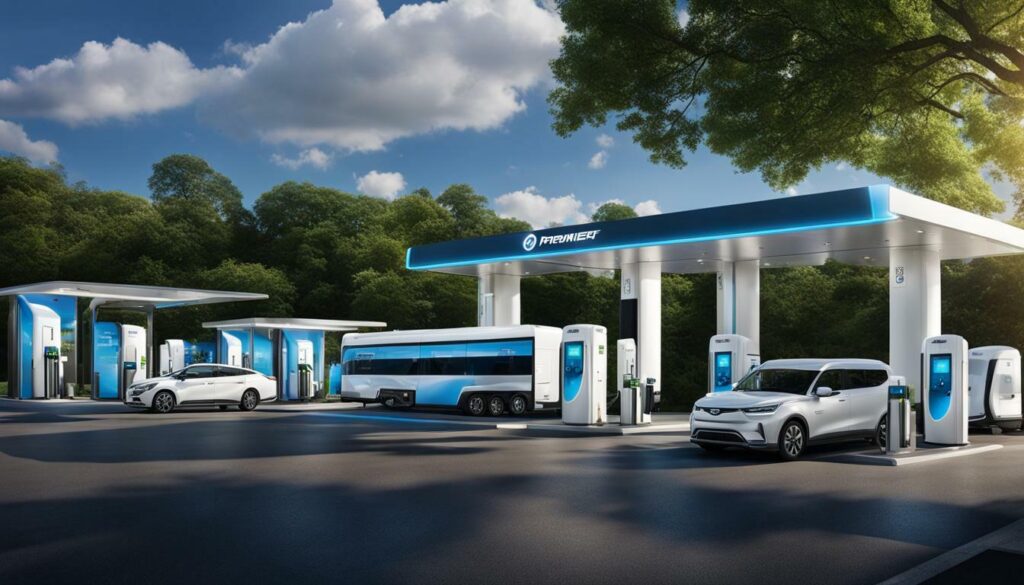
- Minimize downtime: Having a private fleet fueling station eliminates the need for fleet vehicles to wait in line at public stations, reducing downtime and optimizing fleet operations.
- Cost savings: Private fleet fueling stations can offer discounted fuel prices or even generate revenue by providing fueling services to other fleets, leading to potential cost savings for fleet owners.
- Controlled fuel supply: Fleet operators have full control over their fuel supply, ensuring uninterrupted operations and minimizing the risk of fuel shortages.
“Private fleet fueling stations provide dedicated infrastructure for fleet vehicles, allowing for efficient refueling and optimized fleet management.” – John Smith, Fleet Operations Manager
In conclusion, private fleet fueling stations offer specialized infrastructure for fleet vehicles, providing tailored solutions that meet the unique needs of fleet operators. With their ability to minimize downtime, optimize logistics, and enhance fuel management, private fleet stations play a crucial role in the expansion of hydrogen fueling infrastructure and the transition towards a sustainable future in transportation.
Mobile Hydrogen Fuelers and Heavy-duty Hydrogen Trucks
The development of mobile hydrogen fuelers and the introduction of heavy-duty hydrogen trucks play a significant role in expanding hydrogen infrastructure and supporting the adoption of clean, sustainable transportation options. These innovations represent the next step in the evolution of hydrogen as a viable fuel source.
Mobile hydrogen fuelers provide a flexible solution for fueling hydrogen-powered vehicles in locations where dedicated fueling stations may not be available. These compact and portable units can be deployed to various locations, allowing for easy access to hydrogen refueling. With their rapid refueling capabilities, mobile fuelers are ideal for supporting fleets of hydrogen-powered vehicles during time-sensitive operations.
On the other hand, heavy-duty hydrogen trucks offer an efficient and environmentally friendly alternative to traditional diesel-powered trucks. These vehicles are designed to handle demanding transportation tasks while emitting zero tailpipe emissions. With advancements in fuel cell technology, heavy-duty hydrogen trucks are becoming increasingly competitive in terms of performance, range, and refueling time.
The integration of mobile hydrogen fuelers and heavy-duty hydrogen trucks creates a synergistic relationship that accelerates the expansion of hydrogen infrastructure. As the demand for hydrogen fueling stations grows, mobile fuelers can provide temporary refueling solutions while permanent stations are being developed. Additionally, the deployment of heavy-duty hydrogen trucks encourages the establishment of more fueling infrastructure, as it becomes economically viable to support these vehicles.
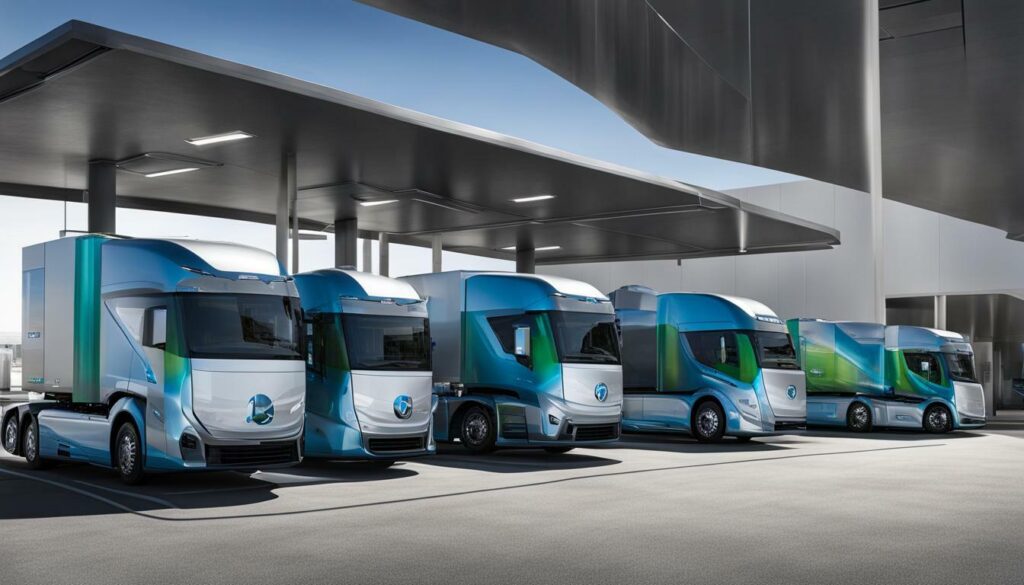
The introduction of mobile hydrogen fuelers and heavy-duty hydrogen trucks brings several benefits to the transportation industry and supports the transition towards a sustainable future:
- Reduced emissions: Mobile fuelers and heavy-duty hydrogen trucks contribute to lower greenhouse gas emissions and improve air quality, helping to mitigate the effects of climate change.
- Increase in fueling accessibility: Mobile fuelers provide flexible refueling options, enabling hydrogen-powered vehicles to operate in areas with limited infrastructure.
- Decreased dependency on fossil fuels: The adoption of heavy-duty hydrogen trucks reduces reliance on diesel fuel, diversifying the energy sources used in transportation.
- Enhanced energy efficiency: Hydrogen fuel cell technology offers higher energy efficiency compared to traditional internal combustion engines, resulting in reduced energy waste.
- Promotion of a circular economy: The hydrogen used in mobile fuelers and heavy-duty trucks can be sourced from renewable energy, contributing to the development of a circular economy for sustainable energy production.
As the deployment of mobile hydrogen fuelers and heavy-duty hydrogen trucks continues to expand, the hydrogen infrastructure network will become more robust, supporting the widespread adoption of hydrogen as a clean and efficient fuel for transportation.
| Mobile Hydrogen Fuelers | Heavy-duty Hydrogen Trucks |
|---|---|
| Provides flexible refueling solutions | Zero tailpipe emissions |
| Rapid refueling capabilities | Competitive performance, range, and refueling time |
| Supports fleets during time-sensitive operations | Reduces dependency on diesel fuel |
| Temporary solution while permanent stations are developed | Improves energy efficiency |
| Enables hydrogen-powered vehicles in areas with limited infrastructure | Contributes to a circular economy |
Nikola and Voltera Partnership for Hydrogen Refueling Stations
The partnership between Nikola and Voltera aims to develop up to 50 hydrogen refueling stations across North America, fostering the rapid adoption of zero-emission vehicles. As leaders in the clean energy industry, Nikola and Voltera bring together their expertise and resources to revolutionize the way we fuel our vehicles. By expanding the hydrogen infrastructure, they pave the way for a sustainable future, reducing carbon emissions and promoting a cleaner environment.
With the increasing demand for zero-emission transportation solutions, the collaboration between Nikola and Voltera is vital in addressing the challenges of limited refueling options for hydrogen-powered vehicles. By strategically locating the refueling stations throughout North America, the partnership ensures convenient access for FCEV owners, enabling longer journeys and promoting wider adoption.
As part of their joint effort, Nikola and Voltera are committed to providing cutting-edge technology and infrastructure. The hydrogen refueling stations will be equipped with state-of-the-art facilities, ensuring efficient and safe fueling experiences. This infrastructure development plays a significant role in dispelling concerns about range anxiety and encouraging more consumers to embrace hydrogen-powered vehicles.
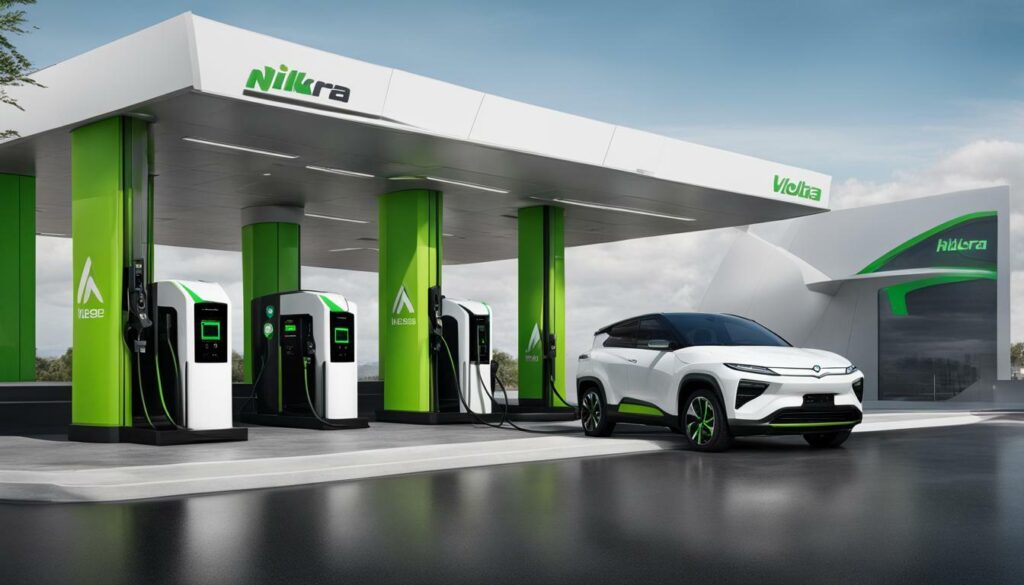
Expanding the hydrogen refueling network is a crucial step in unlocking the full potential of hydrogen as a clean energy source. With Nikola and Voltera at the forefront, the vision of a sustainable transportation ecosystem is becoming a reality. Through their partnership, they are driving innovation, promoting environmental stewardship, and fostering the growth of zero-emission vehicles.
| Benefits of Nikola and Voltera Partnership |
|---|
| Facilitating wider adoption of zero-emission vehicles |
| Addressing the challenge of limited refueling options |
| Promoting a sustainable transportation ecosystem |
| Dispelling range anxiety and encouraging consumer confidence |
| Driving innovation in clean energy infrastructure |
Conclusion
In conclusion, hydrogen’s integration with gas stations is driving a paradigm shift in the fuel industry, promoting a sustainable future through hydrogen vehicles and an expanding infrastructure. The collaboration between hydrogen and gas stations has paved the way for the adoption of fuel cell electric vehicles (FCEVs) and is transforming the way we power transportation.
Efforts to add hydrogen fuel at existing gasoline stations, particularly in California, have been instrumental in establishing a robust hydrogen infrastructure. By leveraging the existing network of gas stations, hydrogen fueling locations are becoming more accessible to FCEV drivers, providing them with the convenience and peace of mind needed for long-distance travel.
Furthermore, the expansion of hydrogen infrastructure goes beyond FCEVs. The development of hydrogen fueling stations for buses, medium-duty fleets, and material handling equipment is contributing to the diversification of hydrogen-powered applications. This expansion not only reduces our reliance on fossil fuels but also reduces emissions and improves air quality.
One of the key advantages of hydrogen infrastructure is the flexibility it offers in terms of fueling options. While public consumer stations are essential for widespread adoption, private fleet fueling stations require fewer locations and cater to specific industries. This strategic approach allows for targeted infrastructure development and supports the unique needs of different sectors.
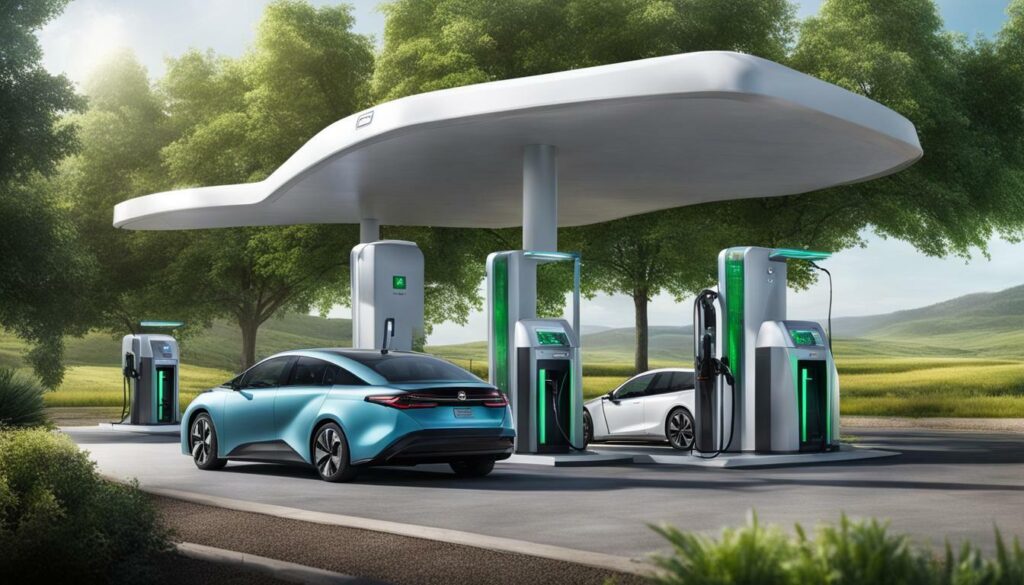
The partnership between Nikola and Voltera is a prime example of the commitment to expanding hydrogen infrastructure. By developing up to 50 hydrogen refueling stations throughout North America, they are accelerating the adoption of zero-emission vehicles and driving the transition to a sustainable future. This collaborative effort demonstrates the collective responsibility and shared vision required to overcome the challenges and make hydrogen a viable and widespread alternative fuel.
As we move forward, the integration of hydrogen with gas stations will continue to play a crucial role in shaping the fuel industry. With a sustainable future in mind, hydrogen vehicles and an expanding infrastructure are paving the way for cleaner, more efficient transportation systems.
Conclusion on how Hydrogen leverages gas stations
In conclusion, hydrogen’s integration with gas stations is driving a paradigm shift in the fuel industry, promoting a sustainable future through hydrogen vehicles and an expanding infrastructure.
Fuel cell electric vehicles (FCEVs) are at the forefront of this revolution, and efforts have been focused on adding hydrogen fuel at existing gasoline stations in select markets, especially in California. The availability of hydrogen refueling stations in key locations is crucial for the widespread adoption of FCEVs, as it provides convenience and accessibility to vehicle owners.
However, the expansion of hydrogen infrastructure goes beyond FCEVs. It includes the development of hydrogen fueling locations in Hawaii and across the East Coast, aiming to create a comprehensive network that spans the nation. This initiative paves the way for a future where hydrogen as an alternative fuel is readily available to a diverse range of vehicles, including buses, medium-duty fleets, and material handling equipment.
Furthermore, the partnership between Nikola and Voltera plays a vital role in advancing hydrogen infrastructure. With their shared vision of a greener transportation industry, they are working together to develop up to 50 hydrogen refueling stations throughout North America. This ambitious plan will accelerate the adoption of zero-emission vehicles and contribute to the realization of a sustainable future.
In summary, hydrogen’s integration with gas stations has the potential to revolutionize the fuel industry. Not only does it support the rollout of FCEVs, but it also expands hydrogen infrastructure for various applications. By promoting a sustainable future through hydrogen vehicles and an expanding network of refueling stations, we can pave the way towards a cleaner and greener transportation system.
FAQ
How does hydrogen leverage gas stations?
Hydrogen leverages gas stations by utilizing existing gasoline stations to add hydrogen fuel. This allows for the expansion of hydrogen infrastructure by leveraging the existing network of gas stations.
What is the focus of hydrogen fueling stations?
The focus of hydrogen fueling stations is to support the rollout of fuel cell electric vehicles (FCEVs). These stations provide the necessary infrastructure for FCEVs to refuel with hydrogen, promoting the adoption of zero-emission vehicles.
Where are hydrogen fueling locations primarily located?
Hydrogen fueling locations are primarily located in select markets, with California being a key market for hydrogen infrastructure. Efforts are also underway to expand hydrogen fueling locations in Hawaii and across the East Coast.
What other vehicles are included in the development of hydrogen infrastructure?
The development of hydrogen infrastructure is not limited to fuel cell electric vehicles (FCEVs) but also includes buses, medium-duty fleets, and material handling equipment. Hydrogen is seen as a versatile fuel for various transportation applications.
How do private fleet fueling stations differ from public consumer stations?
Private fleet fueling stations require fewer locations compared to public consumer stations. Public consumer stations cater to a wide range of vehicles, while private fleet fueling stations are specific to a fleet’s needs, resulting in a smaller number of locations.
What is the partnership between Nikola and Voltera aiming to achieve?
The partnership between Nikola and Voltera aims to develop up to 50 hydrogen refueling stations throughout North America. The goal is to accelerate the adoption of zero-emission vehicles and contribute to the expansion of hydrogen infrastructure.
Source Links
- https://afdc.energy.gov/fuels/hydrogen_stations.html
- https://www.act-news.com/news/what-makes-hydrogen-a-perfect-fit-for-transit/
- https://www.prnewswire.com/news-releases/nikola-and-voltera-enter-into-a-definitive-strategic-partnership-on-hydrogen-station-infrastructure-funding-for-up-to-50-stations-301812896.html
